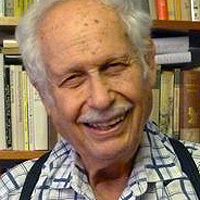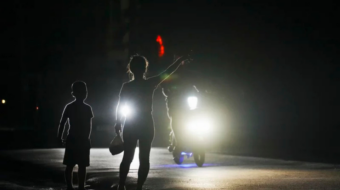
BERLIN—“Jack and Jill climbed up a hill to fetch a pail of water. Jack fell down and broke his crown and Jill came tumbling after.”
It wasn’t exactly like the nursery rhyme, but somehow there were similarities. Only this hill is the job as German chancellor after the September elections — with Angela Merkel going into retirement.
The co-chair of the Greens party, not Jack but Robert Habeck, had allegedly dreamed of that job for ages — and in the past few years, the polls showed his party climbing incredibly. By this April, long after leaving the traditional second force in Germany, the Social Democrats (SPD), choking in its dust, the Greens suddenly achieved the amazing feat of moving into first place, overtaking — by one point — the perpetually victorious “Christian Union” twosome (in Bavaria it is a separate sister). That pail of political water really seemed within his reach — until two things happened.
The Jill this time was Annalena Baerbock, his co-chair. At the party confab, conducted mostly virally, she pushed him aside with one graceful hand, delivered one of her wonderfully bright, personalized speeches, full of hope for a giant upset, and became the party’s contender for that chancellor job!
But alack and alas, she, like Jill, came a-tumble. It seems that, after legally receiving a Christmas gift of 24,000 euros from her party, she somehow neglected to report it in her tax returns. No big deal, some might think, but after the scandals about Christian Democrats nobly enriching themselves when purchasing face-masks, and two far bigger scandals hanging over the head of the Social Democrats’ chancellor candidate Scholz (currently still Finance Minister), the squeaky clean reputation of the Greens had been a major asset. No longer! And then it was discovered that Baerbock had also made minor embellishments in her curriculum vitae so that it seemed she had completed courses and held offices which she hadn’t. Oh gracious — that too!
It was already too late to switch back to Robert Habeck. So it was contended that minor transgressions like that would hardly be noticed if people were not out to get her for political reasons. That was probably true, but didn’t help a bit. And to cap it off, while she and the party were sweating hard to diminish the damage, an expert (in Austria!), obviously on the lookout, found that an election-time book she had published about her life and mission included hunks of text copied from other sources — without labeling them as such! It had not, she insisted, been plagiarism to get a diploma, and everyone gathers facts elsewhere for their books, right? And so on! But then it was found that when another politician was caught at plagiarism some years ago, Green indignation had been boundless.
The result in the opinion polls: the Greens had briefly edged ahead of the Merkel Christians in April, 28% to 27%. Now in July they were thirteen points behind (18% to 31.5%). That was really tumbling!
Some might feel sad or sympathetic; she is such a pleasant, happy candidate. But such feelings are misplaced. Both Frau Baerbock and Herr Habeck head a party whose position has long centered on “a hard course towards Russia,“ now also against China, and while many German business and political leaders, including Merkel, want to complete the Baltic Sea pipeline and achieve a détente with Russia, Baerbock and Habeck kowtow to U.S. frackers and Washington’s gung-ho Cold Warriors.
Habeck visited front lines in Ukraine in May, decked out in steel helmet and armored vest, and urged an end to Germany’s official policy: no weapons to conflict areas. For some Social Democrats and Christian leaders, Habeck had gone too far. There are also Green members who still oppose the leaders’ support for buying armed drones, pushing confrontation, and sending troops to foreign wars.
But despite occasional doubts, the main parties all approve more aggressive armaments, avowedly “for security and defense” but equipped to land in every corner of the world — or join in blasting any country to bits, abilities they simulate in annual maneuvers along Russian borders.

Only one party in the Bundestag says “No” and has voted “No” every time. That is the LINKE.
But the LINKE also faces problems, big ones. Not like the others who are concealing bribery, plagiarism, or manipulation, but rather how to reach the right audiences with convincing arguments. Its ratings, long at about 10-11 % and in the eastern former GDR states over 20%, have dipped dangerously in the east and nationally as low as 7-8%, on some days 6%. That’s close; if less than 5% of the voters mark the LINKE on their ballots, ending its Bundestag caucus, its voice would be reduced to a faint whisper and the fragile peace movement further weakened despite silent approval by a majority.
A main cause of the drop was still disputing among its leaders, avidly stressed by the media. Again a main question — though largely theoretical because of its weak poll numbers: What compromises would the LINKE accept in order to join a government on the federal level with the Greens and Social Democrats? Those two insist: Never with the LINKE unless it says yes to armed Bundeswehr deployment in countries like Afghanistan and Mali (only for “good causes” of course). And it must support NATO and its military buildup. Some of the LINKE say “OK, compromises are sometimes necessary in politics.“ Others respond: “If we give way on our key principles, how are we different from the others? What good are we?”
The rift represents a basic division; all sides agree on fighting for a higher minimum wage, the return to a pension age of 65 (not 67 or worse), and genuine taxes on the filthy rich, now piling up fortunes higher than ever. But some add: While doing so, we must never lose sight of our basic goal, the only genuine solution to all the dangerous arming and hoarding; we must win people in a long struggle toward achieving ownership of the banks and factories, with no private profits taken away from those who do the work. The taboo word here begins with a big S. Bernie Sanders dared to utter it. But it is too big for some, even in the LINKE.
To make things worse, another rift developed. Sahra Wagenknecht, by now the best known LINKE with regular commentaries in the media, wrote a book calling many LINKE people and Greens “an academic crowd” which pays so much attention to separate groups (or identities) with debates about “gender” classification, environment, or protecting minority groups, that they have lost touch with working people. A few truths may be mixed in here, but a main recent activity of the LINKE has been fighting rent increases and demanding confiscation of the worst real estate giants. Then too, in Sahra’s words there seemed to be hints of a stress on workers of German background having to face wage pressures due to all-too-open doors to immigrants (or even refugees). Some saw here an enticement to workers now voting for the racist Alternative for Germany (AfD) to return to the LINKE fold. Was that really desirable? Or risky? There were a few angry demands for her expulsion. Others said such quarrels, shortly before crucial elections, seemed suicidal.
The LINKE had elected a duo in the fight for the chancellor job (since chances of winning the lead were non-existent). One, Dietmar Bartsch, a leader in the Bundestag caucus, belonged to the less militant wing of the party, but was male and East German, thus keeping the traditional balance. The other, a new co-chair of the party from western Hesse, was Janine Wissler, a keen young fighter. In a sharp back-and-forth TV interview, she stressed that the LINKE must stick to principles which mattered more than any possible (and currently hardly likely) hope for a government cabinet seat.
The LINKE should fight hard on current issues but must keep its eyes on future goals, she said, and despite differences, including those with Wagenknecht, must stick together in a united battle to stay in the Bundestag, not just the needed 5% but aiming at 10%. And it must keep up its fight for peace!
Wissler proved as adept a speaker as the Green’s Baerenbock and seemed, for me at least, far more genuine. Will she, and her well-spoken but cooler, less militant East German partner lead in a success story, new strength, with no awful tumbles? We will know after September 26.










